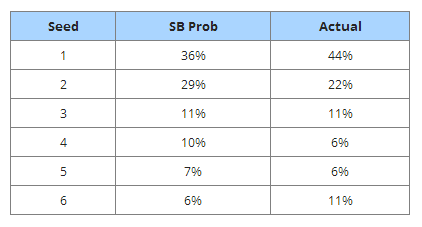PatriotSeven
In the Starting Line-Up
- Joined
- Dec 23, 2011
- Messages
- 2,906
- Reaction score
- 182
Which has already been explained. You're noting the difference in win probabilities by seed between pre-salary cap era teams and salary cap era teams. [/B]If your conclusion is anything other than "the salary cap increased parity among playoff teams", then you would be failed out of a 101-level statistical modeling course for reaching that conclusion.
So based on an extraordinarily small sample size, while failing to account for obvious outside factors that would create the change that you're observing, you're ready to call shenanigans? Again, I don't want to be a **** here, but you're little plowing through just about every fallacy in the Statistics 101 textbook. You're genuinely clueless as to the subject matter that you're dealing with.
There's nothing to disprove. The facts are the facts. Small sample size aside, the data suggests that the league has achieved parity in recent years, as compared to past years. Nobody has denied this at any point in this thread. Where you seem to think that this proves your case, you're simply wrong, because it's easily explainable without resorting to all of the insane bull**** that you're espousing. It's just the salary cap having its intended effect. Nothing more and nothing less.
For the 4th time in this thread: NO I AM NOT!
I have looked at it prior to the salary cap era. Prior to the 5th seed. Prior to the 6th seed. Including the 6th seed. After the divisional reshuffle. And yes also as a whole. And that is not simply what's being compared. So please stop repeating this nonsense, cause it's just not true.
In addition, you are insanely dense if you do not understand that playoff format probabilities and salary cap do not have the impact you believe it to have. If anything, in this day and age, they should adhere even closer to the expected probabilities of each seed due to the current tournament structure. Not deviate more, but adhere even CLOSER! The salary cap argument works in favor of my point, not yours! I don't think you have grasped this yet.
Even IF you were to assume the seeds were 100% of equal strength due to the salary cap era(which is nonsense in the first place) you should STILL expect to get results that are similar to this:
SB appearance probabilities:
Seed 1: 36.00%
Seed 2: 29.00%
Seed 3: 11.00%
Seed 4: 10.00%
Seed 5: 7.00%
Seed 6: 6.00%
Do you understand this?


















